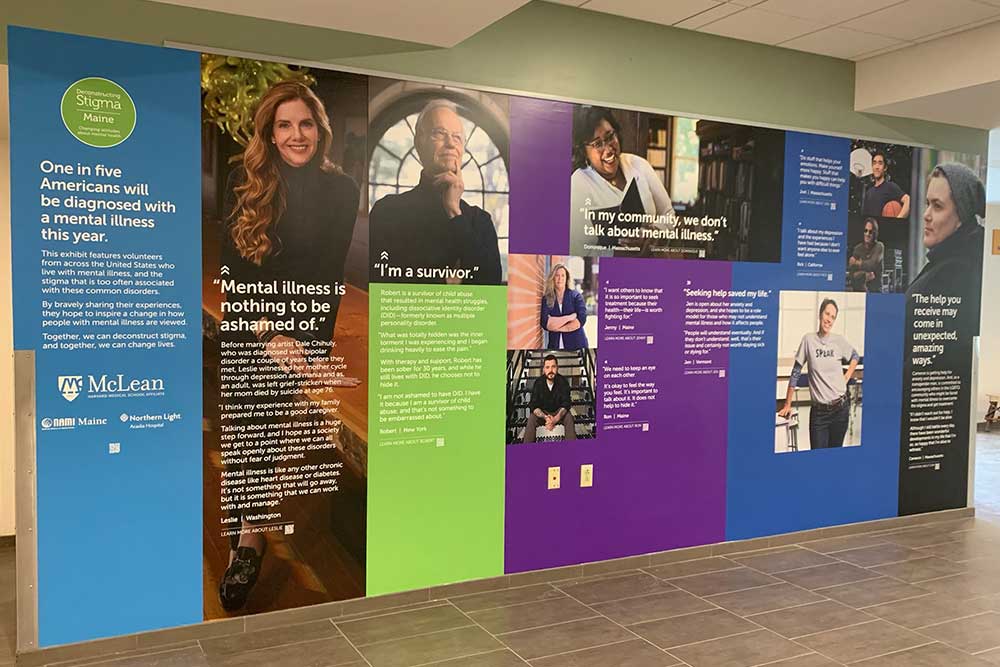Bangor International Airport (BGR) has a longstanding tradition of supporting the people of Eastern Maine and the surrounding region, including welcoming more than a half a million service members returning from overseas activities and other U.S. military engagements.
BGR is continuing its efforts to support members of the military, first responders, and others by partnering with Boston’s McLean Hospital to install Deconstructing Stigma: Changing Attitudes About Mental Health throughout the airport.
This exhibit, featuring Mainers, celebrities, and people from around the globe who struggle with mental health and substance use disorders themselves or in their families, is intended to raise awareness and encourage honest conversations about mental health.
Collaborating With BGR
McLean Hospital’s Education Outreach team began working in Maine, conducting speaking tours in local communities, and collaborating with the Maine Department of Corrections in 2017.

After successful collaborations throughout Eastern Maine over several years, the hospital approached BGR to gauge interest in a partnership that would bring the resilient and inspirational stories of Mainers living with psychiatric disorders to the airport. We could not have been more excited by the airport’s enthusiastic response.
While the project had to be placed on hold due to the COVID-19 pandemic, in 2021, we re-engaged in conversations and are thrilled to be partnering with BGR to bring a Maine-focused mental health awareness and anti-stigma campaign to the Queen City.
Changing Attitudes About Mental Health
“I have a trauma history with 36 years of law enforcement, and there’s a combat component from my service in Iraq. Because of this, I think I’ve always had an interest in assisting other officers. In corrections and law enforcement, there are a lot of military veterans that bring that trauma with them, so I try to ensure that my peers and subordinates keep an eye on each other and that we take care of one another emotionally as it relates to our profession.”
Among the people profiled in the exhibits, which can be seen by travelers are pre- and post-Security, is Randall, a former member of the U.S. military who after returning home from Iraq, dedicated his career to law enforcement. As commissioner for the Maine State Department of Corrections, Randall volunteered to be part of Deconstructing Stigma to help others recognize that there is no shame in asking for help.

Each of the volunteers from Maine and beyond shares their story to encourage others to seek care and to know they are not alone. Though each person is unique, and their story is personal, the experiences of coping with mental health conditions and stigma are similar. The goal of Deconstructing Stigma is to share the individual voices and by doing so, highlight the commonality that all of us share—mental health affects everyone.
Facts About Mental Health in Maine
- In 2019, nearly one in three (about 18,300) Maine high school students reported feeling sad or helpless for at least two weeks in a row in the previous year; rates have steadily increased from 2011 (23%) to 2019 (32%)
- In 2017–2018, more than one in five adults in Maine reported experiencing any mental illness in the past year, with adults between 18 and 25 years old experiencing the highest rate (31%)
- In 2019, suicides (269) in Maine were more than 11 times greater than homicides (23). The suicide rate for men was four times higher compared to women, and higher among adults aged 26 to 34
- In 2019, one in seven (16%) Maine high school students seriously considered suicide in the past year while 9% reported actually attempting suicide in the past year
- Among the students who felt sad or hopeless in the past year, 31% did not seek help, 30% went to friends for help, 17% went to parents/adult relatives, and 4% confided in teachers/school staff
- Maine has one of the highest rates of major depressive episodes among 18 to-25-year-olds in the nation. In 2017-2018, 17% (21,300) of Mainers 18 to 25 reported having at least one depressive episode in the past year. Rates have increased by 55% since 2013-2014 (11%)
Source: This data is a product of the Maine State Epidemiological Outcomes Workgroup (SEOW). More information.
Get Support
Many organizations throughout Maine offer support and services to individuals and families in need. Find Maine-specific resources.
